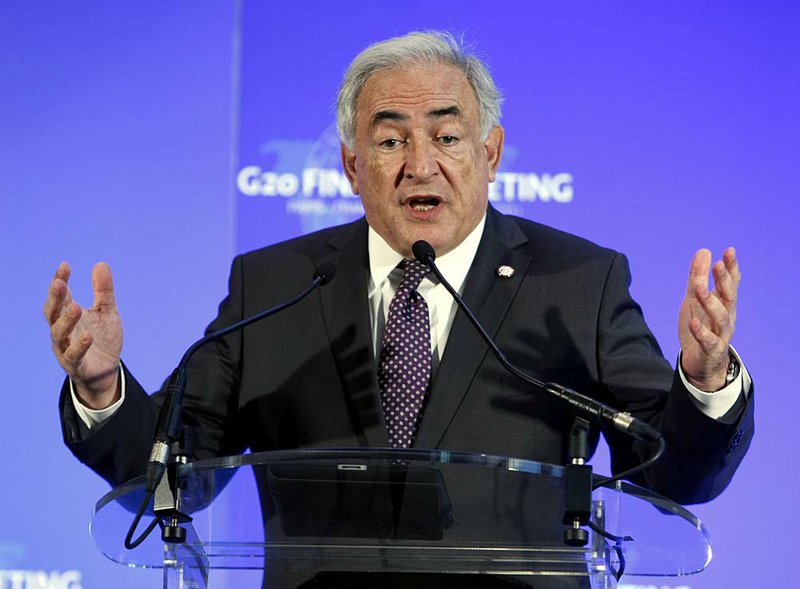PARIS — The world’s dominant economies took a small step Saturday toward smoothing out the global trade and currency imbalances at the root of the global financial crisis, overcoming Chinese objections and setting the stage for even tougher negotiations in the months ahead.
Finance ministers and central bankers from the United States, Britain, China and other large developed and developing economies during the Group of 20 meeting struck a compromise after all-night talks on how such imbalances should be measured.
Large surpluses and deficits, notably those between the United States and China, have been identified as one of the key causes of the 2008 financial crisis that plunged the world into its worst economic recession in 70 years. Saturday’s agreement will allow leaders to shift their focus to establishing thresholds - albeit nonbinding ones - for the criteria, which include debt, deficit and savings levels.
Officials agreed on a list of economic indicators - from trade balances to private savings rates - by which to measure the scope of the problem.
Leaders hope that this will help head off another financial crisis by preventing the accumulation of large surpluses and deficits, which can lead to damaging distortions in interest rates, inflation and economic growth.
“The negotiations have been frank, sometimes tense,” but in the end a compromise was reached, said French Finance Minister Christine Lagarde.
China’s large surplus in its current account, a measure of trade and capital flows in and out of a country, made it reluctant to include that as one of the G-20’s yardsticks. Compromise wording was agreed on making that indicator a mix of current account balance - the indicator most countries wanted - and trade balance - the indicator China had been pushing for.
Lagarde said the G-20 members succeeded where G-20 talks in Seoul, South Korea, in November failed because the “balanced compromise doesn’t stigmatize any one country.”
“It includes a panoply of indicators that will allow us to measure the strengths and weaknesses of each member’s economic policies without discriminating against or stigmatizing anyone,” Lagarde said.
But International Monetary Fund Managing Director Dominique Strauss-Kahn criticized the deal, suggesting that the compromise was watered down because of national self-interest.
“What I was worried about - I’m sorry to say - materialized: which is that it’s more difficult than it was before to have people agree,” he said of the international coordination during the crisis. “When they were really scared, they were happy to find a consensus. Now that many believe - wrongly - the crisis is behind us and they have domestic concerns ... they’re less concerned by multilateral coordination.”
The indicators also include public debts and deficits and private debt levels and savings rates. Exchange rates, long a sticking point in Chinese-U.S. relations, were not included in the list, but they will be considered as part of the current account analysis.
Foreign currency reserves were excluded from the list, Lagarde said. Other officials said they survived under the oblique heading of “other policies.”
With agreement on what to measure, work will now begin on the more difficult task of setting what the G-20 calls “indicative guidelines” against which to measure each of the criteria. Lagarde said the goal is to agree on this at the next G-20 finance ministers meeting in Washington in April.
Asked whether the difficulty in deciding the list of indicators presaged even more difficult talks over thresholds and enforcement, Lagarde said “I take things one day ata time. If it is difficult, it will be difficult.”
The deal is a partial success for France, which holds the presidency of the G-20 this year. However, the more difficult steps of agreeing at what point imbalances actually become dangerous and how they can be mitigated were left for later meetings.
To underline the obstacles ahead, German Finance Minister Wolfgang Schaeuble - whose country’s current account surplus is even bigger than China’s as a proportion of its economic output - said Saturday that he would resist any firm numerical targets to be attached to some of the indicators.
The G-20, which became the key international forum for economic decision-making during the financial crisis in 2008 and 2009, is struggling to retain its relevance as some parts of the world are starting to recover while others are still lagging behind. Emerging markets like China and Brazil exited the crisis in much better shape than more traditional economies like the U.S., Europe and Japan.
There is broad agreement within the group on the need for countries such as China to consume more, save less and let their currencies strengthen to become less reliant on exports for growth. But the questions of how fast, how to go about it and the role of U.S. policies have caused divisions.
Information for this article was contributed by Jamey Keaten of The Associated Press.
Front Section, Pages 9 on 02/20/2011

